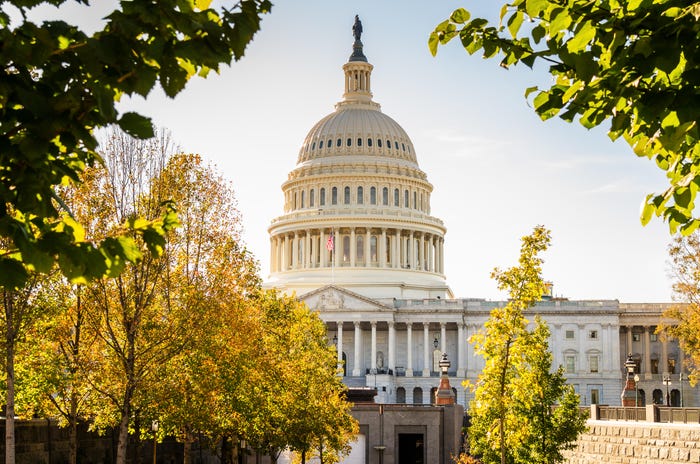FirstNet Authority reauthorization by Congress ‘critical,' CEO Wassel tells boardFirstNet Authority reauthorization by Congress ‘critical,' CEO Wassel tells board
Convincing Congress to reauthorize the FirstNet Authority—the government entity that oversees the FirstNet nationwide public-safety broadband network—during the next 26 months is “critical,” FirstNet Authority Executive Director and CEO Joe Wassel said last week.

Convincing Congress to reauthorize the FirstNet Authority—the government entity that oversees the FirstNet nationwide public-safety broadband network—during the next 26 months is “critical,” FirstNet Authority Executive Director and CEO Joe Wassel said last week.
Wassel cited reauthorization as a FirstNet Authority priority for 2025 during a presentation to FirstNet Authority board members—most of whom were attending their first board meeting for the organization.
“Reauthorization is critical,” Wassel said during the FirstNet Authority board meeting, which was webcast. “The Middle Class Tax Relief Act of 2012, which created the FirstNet Authority, contains a provision that sunsets the organization in February 2027.
“Congressional reauthorization will enable the FirstNet Authority to continue its vital role, managing and overseeing FirstNet to ensure that the public-safety community has the broadband-communication tools it needs to perform its critical tasks.”
Most Beltway sources believe Congress ultimately will reauthorize the FirstNet Authority, because the organization has overseen the establishment of FirstNet, which provides more than 6.4 million connections to more than 29,000 public-safety agencies, according to report from contractor AT&T.
In addition, the FirstNet Authority is one of the few aspects of the federal government that does not require new funding from Congress. Under its 25-year contract with AT&T, the FirstNet Authority’s operations are fully funded through at least March 2042 through annual payments by AT&T.
This public-private partnership requires AT&T to build, operate and maintain the FirstNet public-safety broadband system and to pay the FirstNet Authority a total of $18 billion during the 25-year deal. In return, AT&T received $6.5 billion—money Congress allocated from FCC spectrum-auction proceeds—from the FirstNet Authority for completing the initial five-year buildout of the NPSBN on time, according to the FirstNet Authority officials.
Most importantly, the deal gives AT&T access to a nationwide 20 MHz swath of 700 MHz spectrum—known as Band 14—licensed to the FirstNet Authority. These airwaves can be used by AT&T throughout the 25-year contract period to provide commercial services, when they are not being used by prioritized public-safety users.
Officially, the FirstNet Authority has more than two years to secure reauthorization from Congress. However, some in the first-responder community have expressed hope that reauthorization is not approved as part of a last-minute deal. Such a scenario could require public-safety agencies to expend resources unnecessarily on contingency plans in the case that the FirstNet Authority is not reauthorized, according to these sources.
Other sources have advanced the possibility that Congress would reauthorize the FirstNet Authority, but lawmakers might try to include greater oversight of the organization—something some critics have sought, particularly in the wake of a high-profile outage in February and a series of Inspector General publications.
Wassel made his statements about reauthorization during the Dec. 11 meeting of the FirstNet Authority board, which marked the first meeting for seven new members, including new board Chair Keisha Lance Bottoms, the former mayor of Atlanta and former senior advisor to President Joe Biden.
Some of the $15 billion in discretionary funds that the FirstNet Authority must invest in the NPSBN system were earmarked by the previous board early this year, Wassel noted.
“Over the next 10 years, we are committed to spending $8.3 billion on coverage enhancement and network evolution,” Wassel said during the board meeting. “The [FirstNet] Authority and the board is committed to reinvesting these funds to enhance and evolve the network and keep pace with technology innovations.”
Wassel also vowed to keep FirstNet’s public-safety subscribers informed of the network’s health, particularly during times of network degradation or an outage.
“Our nation’s first responders are called to 24-hour, 7-days-a-week, year-round support of our nation; the network we oversee must also work as they work,” Wassel said during the board meeting. “If there is degradation of capability that we owe the first responders, we owe them information to enable their PACE—primary, alternate, contingency and emergency—plans and ensure restoration of capability to full services as quick as possible. Readiness is key.”
FirstNet Authority officials will continue to “think and act for public safety” by consulting with the first-responder community to inform key decisions, Wassel said. In addition, the organization will work to foster “a culture of information sharing and partnership,” he said.




